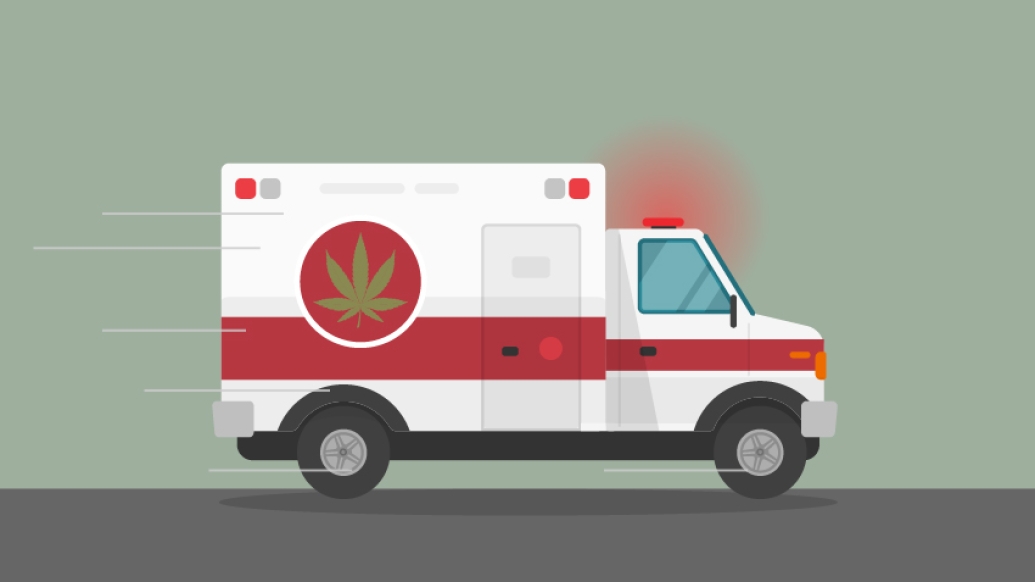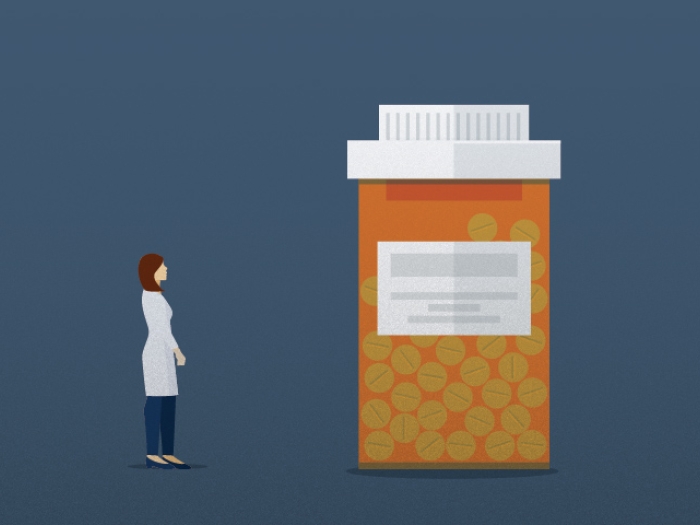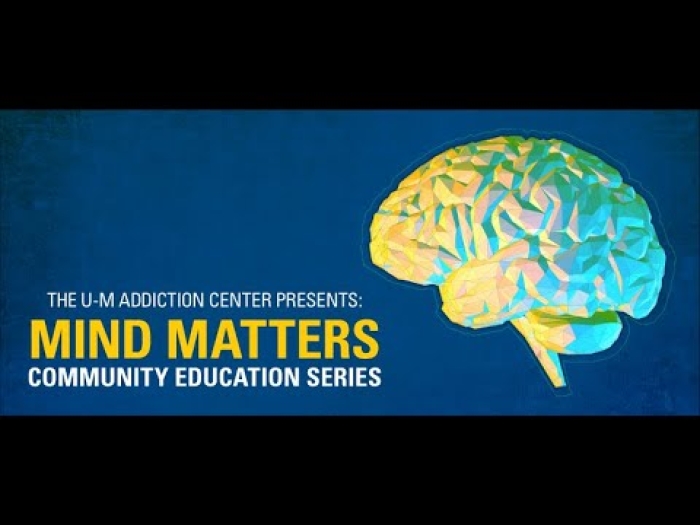Marijuana’s growing availability and public acceptance has brought unintended consequence for users — including some who end up needing emergency care.
7:00 AM
Author |

As more state laws shift to allow medicinal and recreational cannabis use, an unexpected but serious side effect has surfaced: more patients presenting in the emergency department with physical or psychological symptoms of overdose from using marijuana or commercial cannabis products.
And the problem isn't limited to one type of patient or consumption.
LISTEN UP: Add the new Michigan Medicine News Break to your Alexa-enabled device, or subscribe to our daily audio updates on iTunes, Google Play and Stitcher.
It's a wider issue with many root causes and implications for providers, says Christopher Blazes, M.D., a clinical assistant professor of psychiatry and emergency medicine at Michigan Medicine.
"The cannabis of today is not the cannabis of 10, 20 or 40 years ago," says Blazes, who saw a rise in intoxication cases at a previous hospital job in San Francisco and has noted an increase in similar cases in Michigan since recreational marijuana was legalized in the state in late 2018.
"People are smoking marijuana that contains vastly higher concentrations of THC, which is what produces the psychological effects and the feeling of being high," he adds.
"It's a much more powerful drug — and it's more likely to cause psychiatric complications in terms of psychosis, agitation and paranoia."
Even those who aren't smoking marijuana but instead are consuming edible forms or commercial products that contain THC could take too much if they don't know or consider the levels in what they're taking, Blazes says.
Meanwhile, he says, far more people are now using products that contain cannabidiol, or CBD — another marijuana derivative that doesn't cause a feeling of being high — because of changes in federal law.
These products may also lead to unexpected effects at high doses, and much more research is needed on their potential benefits and risks.
Nonexistent criteria for diagnosing marijuana overdose
Blazes notes that his observation of an increase in severe cases of THC-related symptoms is more than anecdotal: A study published in April in the Annals of Internal Medicine found that cannabis-related ED visits have tripled in Colorado since the state legalized the drug for recreational purposes in 2014.
MORE FROM THE LAB: Subscribe to our weekly newsletter
Because past and current federal restrictions have hindered research on marijuana, THC and CBD, no universal guidelines for safe use of those products exist in any context.
Moreover, doctors don't have any standards to rely on when diagnosing a patient.
"We have a pretty good idea how blood alcohol content defines a person's level of impairment; we have no idea with cannabis yet," Blazes says. "When somebody comes into the ED and they admit to using cannabis or seem intoxicated from it, we don't have the tools yet to tease out how much of their impairment is related to the cannabis."
That's because THC intoxication can hinge on wide-ranging factors that include dosage, method of administration (wax, vaping, edibles, etc.) and prior experience with the drug. THC can be detected in the bloodstream after intoxication ends, so current blood tests aren't an effective benchmark.
Ultimately, conclusions may be subjective.
"One patient's diagnosis of being overly 'intoxicated,' which might send them seeking emergency care, might be exactly the state that another patient is trying to achieve," says Blazes, who is also a board-certified addiction psychiatrist at University of Michigan Addiction Treatment Services.
"That's an interesting nuance about this."
No universal standards for marijuana research and medical use
Beyond legalizing limited recreational marijuana use in 2018, Michigan has had a medical marijuana statute since 2008 and allows the sale of THC-containing products to people who have obtained a prescription from a physician for specific diagnoses.
Michigan is second only to California in the number of registered medical marijuana patients. More states are poised to legalize recreational marijuana in 2019.
But despite this, and despite the legalization of medical marijuana in 33 states and a growing use for treating chronic pain, medical marijuana remains a Schedule I drug under the federal Controlled Substances Act. That means it's considered to have no accepted medical use and a high potential for abuse — and is still technically subject to criminal penalties.
[T]here are many third-party, non-physician groups that say, 'Oh, yeah, use cannabis.' We as physicians have no clear recommendations to give.Christopher Blazes, M.D.
As a result, the federal government has strictly limited the type, amount and availability of marijuana that researchers could potentially study, as well as any funding for such research.
"It's incredibly hard for researchers to develop standards," Blazes says. "For any other medicine, we know exactly what dose to prescribe for what condition. Now that this is medicalized, there are many third-party non-physician groups that say, 'Oh, yeah, use cannabis.'
"We as physicians have no clear recommendations to give."
Risks to new and longtime marijuana users
With no safety or verified clinical dosing standards to guide them, some medical cannabis patients may unwittingly ingest too-high doses of THC daily, says Blazes.
"They are just as prone to [intoxication] as people who are using it recreationally," he says, noting that all users may seek out greater quantities as their tolerance builds.
SEE ALSO: Medical Marijuana Gets Wary Welcome from Older Adults, Poll Shows
Newcomers may view marijuana edibles as a safe way to test the waters. But that mode poses its own danger: "There's a slower effect" as the THC is absorbed into the blood from the digestion process, Blazes says. In this case, the chemical reaches the brain much more slowly than if the patient had smoked the cannabis.
If users don't expect this delayed effect, they might consume even more edibles — and become much more intoxicated by THC than they intended.
Low knowledge of marijuana's potential side effects
Chronic daily cannabis users may experience "unexplained vomiting and nausea that is relatively stubborn to most of our treatments," Blazes says. "They can't keep down food or liquids and don't respond to typical medications for nausea."
SEE ALSO: What Drives Patients to Use Marijuana: Mostly Chronic Pain
The drug also affects a person's ability to drive by slowing reaction time and coordination. Despite the increased risk to themselves and other motorists, research by Blazes' U-M colleagues showed that more than half of people with chronic pain says they have driven under the influence within two hours of using medical cannabis.
Acute THC intoxication can affect the heart and vascular system.
Blazes says he has seen patients with cannabis-induced tachycardia, a dangerously rapid heart rate that can be fatal. This is likely a result of increased sympathetic nervous system activity, and postural hypotension (a form of low blood pressure).
THC intoxication can pose special risks to people who have a family history of psychiatric disorders or have been diagnosed themselves, Blazes notes. Those people may not be able to experience the mellow high that most people seek from recreational cannabis and may react differently to THC taken for medical purposes.
Instead, the drug may exacerbate depersonalization, fear of dying, irrational panic and paranoia.
Those seeking pain relief might also be putting themselves at risk.
"There's a growing body of literature that finds people who use cannabis for pain end up with worsening pain over time — minefields similar to what we're experiencing with benzodiazepines and opiates," Blazes says.
If you or a loved one is dealing with addiction or a substance use issue, University of Michigan Addiction Treatment Services offers a comprehensive range of services personalized for individuals and their families. Call 800-525-5188 to schedule an appointment.

Explore a variety of healthcare news & stories by visiting the Health Lab home page for more articles.

Department of Communication at Michigan Medicine
Want top health & research news weekly? Sign up for Health Lab’s newsletters today!





